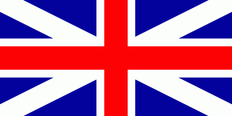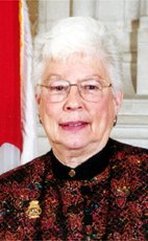
briefest of mentioned when the
history of Canada is discussed.
This is a tad unfortunate as the
arrival of the Loyalists forever
altered the trajectory of British
North America and laid a solid groundwork for a uniquely
Canadian take on governance. They really should be discussed
more. That said, this article isn't going to focus on the failings
of the Canadian education system. Rather, this is a look at
whether remembrance and celebration of the Loyalists could
be improved in the public sphere.
The genesis of this article was in a meeting organized by my
company's head office which basically gave the front line
employees an update on different things the company was
doing. One such thing was the creation of a multi-ethnic
calendar of events. It was fairly thorough, although not
comprehensive. Loyalist Day on May 18 was omitted. Or was
it June 12th? The 19th? The most likely reason it was left off
was due to New Brunswick being the only Atlantic province
that celebrates it and my company being spread out over the
Atlantic provinces. Even if they all celebrated it there are at
least three competing dates for when it is held.
New Brunswick
places it fairly close to Victoria Day (Monarchy Weekend? I'm
all for it). Saint John has traditionally been the standard-
bearer for celebrating the holiday and from 1968-1997 it was a
school holiday in that school district. However it was felt all
holidays should be province-wide which, of course, meant
no more school holiday for anyone.
May 18th was chosen as the date to celebrate this holiday as
by tradition this was the date the Loyalist refugees arrived in
Saint John in 1783.
Ontario
Loyalist's arrival we have United Empire Loyalist Day
celebrated on June 19th in Ontario. The Constitutional Act of
June 19th, 1791 created the province of Upper Canada, or
Ontario as we know it today. But hold on, Kingston, Ontario
celebrates on the 12th which is the date in 1784 Governor
Haldimand at Quebec received permission from King George
III to settle the Loyalists in what would one day become the
Province of Ontario.
Manitoba
Day on June 12th and for the same reason.
Saskatchewan
designating it in 2000. Uniquely, the designation of June 19th
as United Empire Loyalist Day is applied for each year by the
Regina branch of UELAC. The City of Regina itself celebrates
a whole Loyalist Week.
British Columbia
holding its United Empire Loyalist Day on July 22nd. The
significance of this date is a bit removed but the story goes
Sir Alexander MacKenzie, the son of a United Empire
Loyalist is documented as being the first European to
successfully cross the North American continent north of
Mexico on July 22, 1793.
Is This a Good Thing?
Loyalists as being worth celebrating but have no unity in
doing so. I think its clear each province chose a date that was
somehow significant to themselves without considering if
there was a more universal date that could be chosen. I'd
argue this division is a bad thing for one major reason: the
federal government will never make this a national holiday if
it means taking sides or adding to the confusion with yet
another date. Some might ask why it should be a national
holiday. Here are my reasons:
1. It is unifying - Even though the Quebecois and earlier
English settlers had little to do with the Loyalists, everyone
was united in not wanting to be a part of what the Americans
were creating to our south. I would argue it was our first time
agreeing on anything as a country (even if that country was
still some years away from becoming a reality).
2. Diversity among the Loyalists - The Loyalists were a highly
diverse group of refugees fleeing persecution and included
English, Scottish, Germans, Dutch, African, and Iroquois.
From this early example of diverse immigration Canada has
continued to accept peoples of all races and creeds. Canada
also has continued to accept a higher percentage of refugees
in relation to population that most other Western nations.
3. The Loyalist Attitude - In Canada we may get angry at the
government but we don't see it as the enemy. This is a distant
echo of the Loyalist's attitude toward the state. As one Loyalists put it, "There may be a time when redress may not
be obtained. Till then, I shall recommend a legal, orderly,
and prudent resentment." Indeed, if you look hard enough
you quickly come to the conclusion the Loyalists have put
their stamp on how Canadians think of themselves and their
government.
Is there a Suitable Date to Celebrate On?
April 19th - Lord Dorchester used this date as the cut-off for
when a person had to be living in the Thirteen Colonies to be
considered a Loyalist. April is a bit early in the holiday
schedule but Spring does have an association with rebirth
which might be apropos.
May 12th - On this day in 1784 the Treaty of Paris went into
effect creating the United States of America. Not only did this
give finality to the Loyalists' plight, it was also supposed to see
the Loyalists compensated (which never happened). Which,
yes, is a bit of a downer. The treaty itself was signed on Sept.
3rd (and in some sources is called the Treaty of Separation).
June 4th - The birthdate of King George III who was king
during the American Revolution. This is a date the Loyalists
themselves may have held as significant. There are records of
his birthday being celebrated for decades after his death in
1820. It is also during a warmer part of the year but not
before the end of the school year (I am all for kids getting an
extra day off like the one that those in Saint John lost). If
there is one critique about using this date it would be that this
is the second royal birthdate being used (the other being the
somewhat moveable Victoria Day).
Concluding Remarks
around a single date we can raise the prominence of who they
were and what their contributions to Canada are.
Loyally Yours,
A Kisaragi Colour
 RSS Feed
RSS Feed





